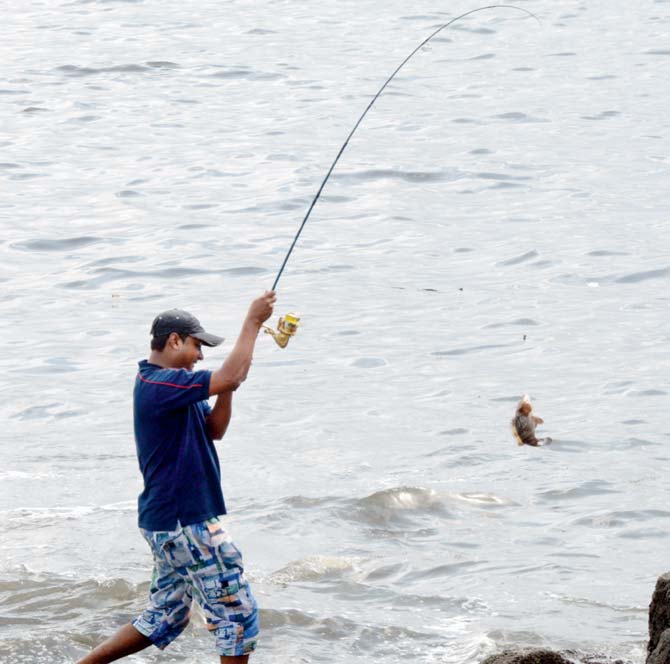08 September,2017 01:05 PM IST | Mumbai | Shunashir Sen
Mumbai has a dedicated community of anglers who are facing a formidable enemy - pollution


Nikhil Shetty catches a grouper. Pics/Satej Shinde
A blue rubber slipper floats by in the muddy waters of the Arabian Sea as Vishal Gill, who owns a tackle shop, sits with his fishing line cast in the water, waiting for his first catch of the day. We are at a rocky outstretch in Madh Island, and Gill's impatience is palpable. A fish had only just nibbled at his bait and then made a timely escape before he could pull it in. In the sport of angling, that's as frustrating as it is for a footballer to hit the bar of a goal post when the score is tied in the 90th minute.
A group of anglers fix their fishing rods in Madh Island
The entire thrill of angling lies in the 'fight'. Gill - whose surname has more than a touch of irony in it - explains to us what that is. In doing so, he inadvertently summarises the premise of Ernest Hemingway's The Old Man and the Sea. The book narrates the tale of Santiago, a withered Cuban fisherman who struggles over roughly 100 pages to reel in the most monstrous fish he's ever hooked. That struggle is the 'fight'. It's an adrenaline rush that drives Gill and his friends to pursue their passion every weekend, sometimes (admittedly) to the disapproval of their wives. They are a motley crew of six people this Sunday afternoon, but only two of them have caught anything edible. The rest have literally only reeled in plastic bags.
Varieties of hooks and baits used for angling
Prachin Baria, explains what the problem is. He is a Gujarati sales executive who eats fish but, as an angler and conservationist, believes in the practice of catch-and-release.
"See, there are two things," he says, "The first point is that you have to regularise commercial fishing. You can't lay nets thinking that the sea is your father's grocery market. You see a lot of nets here even if you come during the breeding season of the monsoon. It is theoretically a crime. But the corruption level is so high that no one's bothered to stop it."
Baria continues, "Number two is pollution in the water. Like you see, this is all gutter water. It is industrial waste dumped into the sea or in the mangroves, which are hatcheries for fish."
Gill adds that this all-round apathy has resulted in the number of fish dwindling considerably. Even five years ago, he says, the sea was teeming with groupers, snappers, barracudas, barramundis and even stingrays. But this afternoon, Gill fears he will go home empty-handed. It's not that his passion will be abated. Angling, he tells us, is a sport that has no end. There are so many things to learn about that one lifetime is not enough for it. You have to learn about the technicalities of the various components of a fishing rod, tide timings, the cycles of the moon, the stretch of sea most conducive to fishing, and so on. The permutations and combinations that go into guaranteeing a fight are endless.
And even as Gill educates us, he feels a tug on his line and jumps up excitedly to reel his catch in. But halfway through, he realises something's wrong. Sure enough, the bait on his hook - a small sardine - is still there, with some more of it nibbled away. The intended victim, Gill rues, was possibly the same wily fellow that had put one over him earlier. He's had enough for the day. The tide is also rising. So he starts packing up his equipment, leaving the fight for another day. "It's a part of the game," the angler tells us.
Sometimes, man loses and fish wins.